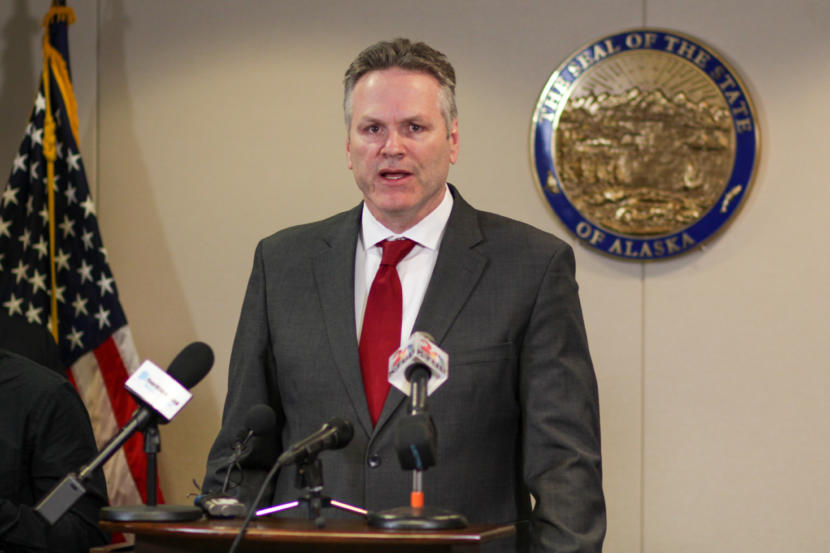
Gov. Mike Dunleavy’s public health emergency disaster declaration is set to expire on Nov. 15. Health care providers and local governments say they need that declaration, which allows them to better respond to the pandemic.
It’s not yet clear whether Dunleavy will extend the declaration.
The Alaska Native Health Board represents regional health organizations and advocates for Alaska Native health. It sent a letter to Dunleavy and state Health and Social Services Commissioner Adam Crum on Oct. 21, asking them to extend the declaration.
Winn Davis, a policy analyst for the health board, explained why the organization sent the letter.
“The crisis of COVID-19 is not over for rural Alaska and it’s not over for Alaska Native communities,” Davis said. “In fact, it’s really just beginning. And we’re seeing that in the really large number of cases that have been coming out from rural Alaska.”
Davis noted that Alaska Natives are disproportionately affected by the pandemic. Alaska Natives and Native Americans are 31.7% of COVID-19 hospitalizations and 33.8% of pandemic deaths, while they are roughly 19% of the state’s population.
Davis pointed out that the Native communities of Chevak, Stebbins, Buckland and Gambell have all had massive outbreaks recently.
Davis said the mandates Dunleavy and state health leaders issued under the disaster declaration in the spring slowed the spread of the virus in rural Alaska. And he said the disaster could worsen if the state ends the declaration.
“It only stands to make the outbreak of COVID-19 worse in our hard-hit rural locations and it stands to exacerbate disparities we’re already seeing in how COVID-19 is affecting Alaska Native communities,” he said.
Every state in the country has operated under some form of emergency order and it doesn’t appear that any state has intentionally ended its order. However, the status of Michigan is unclear after its state supreme court ruled that its governor didn’t have the power to extend a state of emergency.
Keeping Alaska’s declaration aligns the state with federal waivers that hospitals and nursing homes need, according to Jared Kosin, president and CEO of the Alaska State Hospital and Nursing Home Association. He also sent a letter to Dunleavy, urging him to extend the declaration.
Kosin said it’s not certain whether the federal government will continue to waive federal rules if the declaration ends. These waivers have allowed Alaska hospitals to do things like screen patients for COVID-19 outside of emergency rooms or treat COVID patients in outside, alternate sites if there’s a surge in patients.
“That is a major issue because if we lose those flexibilities our ability to deliver care quickly and creatively in the middle of a pandemic is really up in the air,” Kosin said.
Kosin said the hospitals are looking for Dunleavy’s administration to clear up the uncertainty.
“The last thing we need right now in trying to deliver health care is determining whether or not we’re even legally allowed to do so,” he said.
The Alaska Municipal League also sent a letter urging Dunleavy to extend the disaster declaration. The letter said: “navigating through a public health emergency and economic crisis without an emergency declaration in place may be calamitous. Local governments cannot do this on their own, nor should they.”
A group of Democratic and independent House members sent a letter to the Republican governor asking to work together to extend the declaration. They wrote that the recent surge in cases “should be a call to action.”
Dunleavy spokesperson Jeff Turner said Dunleavy hasn’t decided whether to let the declaration expire. Turner said Dunleavy is assessing the situation and will decide by Nov. 15.
Dunleavy discussed the disaster declaration in a phone call with local officials on the Kenai Peninsula last week. They differ over the details of the call — Homer Mayor Ken Castner said Dunleavy said he wasn’t renewing the declaration, while Kenai City Manager Paul Ostrander said the governor said he hadn’t decided.
Under state law, the Legislature must vote to extend disaster declarations beyond the first 30 days. Dunleavy issued the original declaration on March 11 and the Legislature voted in late March to extend it to Nov. 15. Legislative leaders have said that there aren’t enough votes to hold a special session to extend the declaration.
It’s not clear what form an extension would take if the Legislature doesn’t reconvene.
